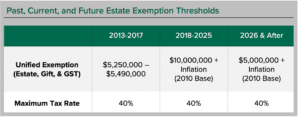The estate tax exemption doesn’t sunset until the end of 2025. So why worry about it now?
Unfortunately, this historically high estate and gift tax exemption offers a short window of opportunity, and it may be closing soon. If you want to preserve more of your wealth, it’s important to take advantage of the current exemptions.
Current Estate Exemptions and What is Changing
In 2017, the gift and estate tax exemption was more than doubled due to the Tax Cuts and Job Act (TCJA), allowing individuals and families to preserve more wealth. Exemptions are currently at historic highs: $13.61 million for individuals and $27.22 million for married couples, with a tax rate at 40% on amounts above this exemption.
However, this is on track to sunset at the end of 2025. Unless there is congressional action, exemptions will revert to pre-2017 levels: $7 million* for individuals and $14 million* for couples, leaving all assets over this amount subject to a 40% estate tax at your passing.
*Estimated for inflation
Simply put, if you want to be able to give away more of your estate to heirs without paying heavy estate taxes, the current legislation – set to expire at the end of 2025 – is currently in your favor.
Where to Begin
Before the estate tax law sunsets, you should start by considering:
- What is your current net worth, and are you exposed to estate taxes now?
- What will your net worth be in 2026 and will you be exposed at that time?
- Do you have current estate planning documents in place already? If so, when was the last time they were reviewed and updated?
- Do you have a business continuity/ succession plan in place for when you pass away?
- If the majority of your net worth is tied to the value of your business, do you have sufficient liquidity to pay any estate taxes?
Steps You Can Take Now
- Review your assets and update your existing documents. If you don’t already have an estate plan in place, connect with your financial or tax advisor to discuss your circumstances.
- Determine your priorities in estate and transition planning. Consider what is best for you, your family, your business, and your tax bill in the long term, not just the short term.
- Understand the true value of your company. If you haven’t had an independent business valuation done lately, engage with a professional to understand what your business is worth.
- Stay informed. Tax changes are a process, so find trustworthy sources to keep you informed on what is happening in Washington.
- Communicate with your family. Start these ongoing conversations early so everyone is on the same page and more prepared for decisions that need to be made.
The Bottom Line
Unfortunately, if you don’t use it, you lose it. If Congress doesn’t address this issue by the end of 2025, estate tax exemptions will be cut in half. Use as much of your exemption now to avoid saddling your family and your beneficiaries with estate tax liability they can’t afford.
In the following webinar, Pinion tax experts describe powerful estate planning tools to reduce or eliminate your estate tax and how to lock in advantages while you can. Watch the full webinar to learn more:
Watch Now
To evaluate your estate tax plan, maximize your returns, or position yourself for tax law benefits ahead of changes, contact a Next Gen Pinion advisor.










